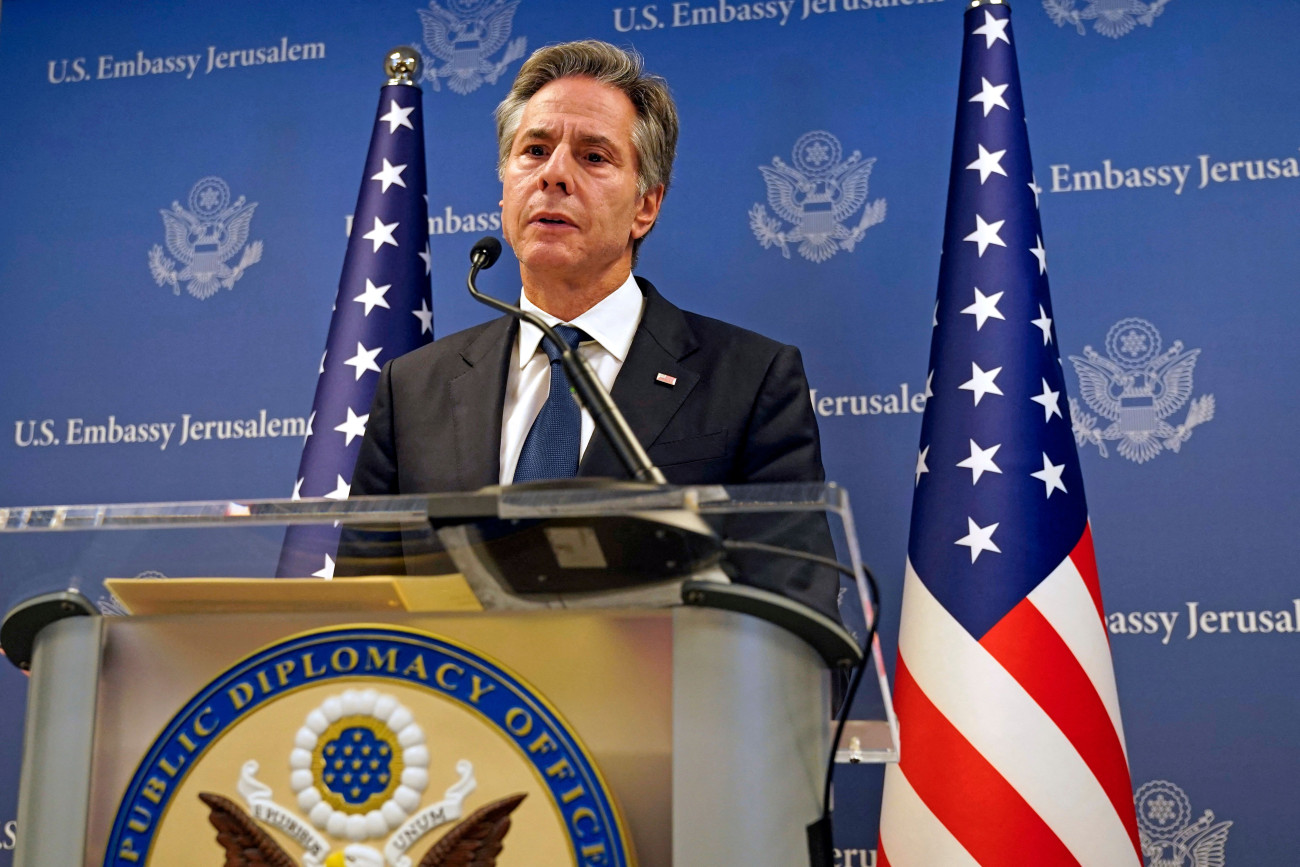

Introduction
Since the horrific Oct. 7 attacks by Hamas and Israel’s subsequent punishing bombing campaign of Gaza, the United States government has sharply ramped up its outreach to the region. President Joe Biden, Secretary of State Antony Blinken, and other high-ranking U.S. officials have all made one or more trips to Israel and neighboring countries in recent weeks. The U.S. military has bolstered its deterrence posture. And U.S. diplomats have set to work coordinating an international response to the worsening humanitarian crisis.
But with Israel poised to launch a ground invasion of Gaza and fears growing that the conflict will spread to neighboring states, what further diplomatic steps should the U.S. take to respond to the Israel-Hamas war and its broadening regional reverberations? MEI has asked a group of former U.S. ambassadors and senior government officials specializing in the region to weigh in.
Photo by JACQUELYN MARTIN/POOL/AFP via Getty Images
Viewpoints
-
Gerald M. Feierstein
Gerald M. Feierstein

US must lead the way back to a multilateral political process to end the Israel-Palestine conflict
The Hamas terrorist attack on Oct. 7 and its aftermath have left Israelis and Palestinians alike traumatized and uncertain of what will come next. In the short term, U.S. diplomacy must focus on achieving three objectives: 1) preventing the expansion of the conflict; 2) ending the fighting as quickly as possible while limiting civilian casualties, including locating and freeing the hostages; and 3) ensuring that humanitarian relief supplies can reach Gaza freely so that Palestinian civilians have access to necessary food, medicine, and shelter. The United States should be clear with the Israeli leadership that Israel’s right to defend itself is not a blank check to undertake any military operation that might recklessly disregard the civilian consequences and that “eradicating Hamas” is unlikely to be an achievable objective at an acceptable cost.
But Oct. 7 has also laid bare the reality that reaching agreement on a sustainable, lasting peace between Israelis and Palestinians can no longer be delayed. In that regard, there are certain fundamental realities that need to be incorporated into a long-term approach to the Israel-Palestine conflict:
-
Violence as an instrument to achieve political objectives — whether terrorism or military operations — has failed. Neither the reality of Israel nor the Palestinian aspiration to self-determination can be defeated or eliminated through force.
-
Non-state actors’ access to increasingly lethal weaponry will continue to grow, making future outbreaks of violence more devastating to civilian populations.
-
What comes next in Gaza is inseparable from the larger question of what comes next in the Israeli-Palestinian context. A political resolution of the conflict based on existing agreements, including Oslo, is essential and the only avenue to break the cycle of violence.
-
There is no alternative to the two-state solution. No other viable, implementable proposal has ever been identified.
While a return to negotiations is a necessity, both the Netanyahu government and the Palestinian Authority are demonstrably not fit for purpose. Thus, it’s likely that in the coming months Israelis and Palestinians will be seeking new leadership. The U.S. should be clear that, to end the violence, both sides need to bring forth leaders who can be “partners for peace.”
It should be clear as well, however, that Washington has failed for decades to fulfill its responsibilities. Over successive administrations, the U.S., having sought to monopolize control over mediation efforts, has rationalized its unwillingness to engage in serious peace efforts as “realism,” and it has ignored both the deteriorating conditions in the Palestinian Territories and the rise of Israeli right-wing extremism determined to obstruct a peaceful transition to an independent Palestinian state. The Biden administration must take this moment to rectify the situation. While the conventional wisdom has been that U.S. presidents do not want to be drawn into Middle East peace negotiations in a presidential election year, avoiding that responsibility is no longer sustainable. President Biden should announce that he is inviting the Israelis and Palestinians along with key counterparts from the United Nations, European Union, United Kingdom, and Arab partners — Egypt, Jordan, Saudi Arabia, the United Arab Emirates, Bahrain, and Morocco — to come to Washington to begin the process anew to resolve the outstanding issues in the Israeli-Palestinian conflict. The process will not be easy or quick, but delay in making clear to Israelis and Palestinians alike that there is a peaceful path allowing both sides to achieve their legitimate aspirations is no longer feasible or acceptable.
Amb. (ret.) Gerald Feierstein is a distinguished senior fellow on U.S. diplomacy at the Middle East Institute (MEI) and director of its Arabian Peninsula Affairs Program.
-
-
Mara Rudman
Mara Rudman

The US diplomatic strategy needs to include planning for “day after”
In the midst of conflict with horrific impact on innocent civilians, any government, including that of the United States, faces extraordinary challenges in staying focused on key national interests and values and identifying the most effective routes for pursuing them. President Joe Biden and his team are doing just that thus far and must continue that steadiness, conviction, and commitment going forward. Equal and parallel efforts are needed on immediate next steps while ensuring an effective plan for the day after Israel’s military campaign ends.
In the immediate period, the United States needs to continue on the pathway President Biden has laid out: 1) maintain clear-eyed focus on the U.S. national security interests at stake and execute an approach that best serves them; 2) ensure that Israel remains confident it has firm support from America and other like-minded democracies on taking appropriate action to defend its people and sovereignty from those who would threaten its (and their) existence; 3) repeatedly convey publicly and privately that the U.S. expects Israel to comply with the rules of war, which means that military means and ends must be consistent with the maximum possible protection of innocents; 4) guarantee that necessarily robust humanitarian aid reaches those in need in Gaza and elsewhere across the region, including through pauses to get aid in and people out; 5) do everything possible to contain the conflict and keep it from becoming a regional conflagration; and 6) in parallel, initiate planning on “day after” next steps with others similarly minded, including countries in the region as well as available Israelis and Palestinians.
Planning for the “day after” must include consideration for how Palestinians in post-war Gaza will be governed initially and over time; how the Palestinian Authority’s ability and effectiveness in the West Bank and Gaza both can be improved and strengthened; and whether there are interim steps whereby the United Nations and/or a consortium of countries in the region step in to temporarily share governance responsibilities, based on a commitment by Israeli and Palestinian leaderships to reinvigorate a pathway toward a two-state solution. Part of (re)building that pathway will require laying down and committing to metrics that can tangibly and measurably improve Palestinian lives. Ultimately, the goal must be to build a more safe, secure, and democratic future for Palestinians, Israelis, and others in the region that will endure for generations to come.
Mara Rudman is a senior counselor at the Center for American Progress, a Schlesinger Distinguished Professor at the Miller Center at University of Virginia, and a former deputy envoy and chief of staff for the Office of the Special Envoy for Middle East Peace at the U.S. Department of State.
-
Robert S. Ford
Robert S. Ford

US can no longer avoid hard choices on the path forward for Palestinians
Governing is about prioritizing. Nearly three weeks into the Gaza crisis, the Biden administration needs to begin making hard choices about how much it really wants a rules-based order and how much it really wants to focus American resources on challenges from China and Russia. President Joe Biden said in his introduction to his National Security Strategy, released a year ago, that “the rules-based order must remain the foundation for global peace.” The strategy later stated that “building an inclusive coalition” for that order “requires upholding founding principles of the U.N., including international law.” Now, United Nations Secretary-General António Guterres, an array of U.N. legal and humanitarian aid experts, and human rights organizations assert that Israel is violating international humanitarian law in its ferocious response to the Oct. 7 Hamas atrocities. Israeli Foreign Minister Eli Cohen’s strong rejection of the principle of proportionality sharply contradicts Secretary of State Antony Blinken’s statement that all lives are equally valuable. Behind closed doors, American diplomacy may have delayed an Israeli ground attack. The quiet diplomacy is not sparing Palestinian civilians from relentless airstrikes that have destroyed most of the health care system in Gaza, however, nor is it restoring humanitarian aid flows to adequate levels. Regional and world thinkers and leaders, even King Abdullah of Jordan, a close U.S. ally, are attacking American double standards. That already diminishes our ability to rally support for other causes, notably Ukraine, but also for humanitarian aid operations in places like Syria and Afghanistan. The Biden administration must choose: sustain unconditional material and public support for what Israel is doing or begin applying American law governing the use of weaponry sent to foreign states such as Israel.
At the same time, Iranian proxies are poking the U.S. and Israel but avoiding serious attacks. Deterrence is holding, barely. Maintaining top-level policymaker attention on the Middle East, and keeping two carrier strike groups and other military reinforcements in the region, reduces resources otherwise needed for threats in Europe and Asia. The U.S. needs de-escalation in the Middle East. An American call for a prompt ceasefire, properly explained first in private and then made public, offers the best way to negotiate that de-escalation, restore humanitarian aid flows, reduce the strain on American resources, and staunch the bleeding of American credibility.
Israel rightly thinks a prompt ceasefire will not last. The Biden administration thought it could secure regional stability through normalization between Saudi Arabia and Israel. That strategy, and the complementary emphasis on trade corridors and indefinite Israeli domination of the Palestinians, has shown its limits. The Palestinians demand more than job opportunities. This week, the president and secretary of state proclaimed that we must sustain the hope of a two-state solution and Palestinian self-determination. Good policymaking differs from sermonizing, however. Washington would need to quickly follow up the ceasefire by laying out an operational path forward toward negotiation of the future of Palestine, defining the Americans’ goal and intermediate steps to reach that goal. The Biden administration has happily avoided going there until now, and doing this in an election year will be enormously hard.
Amb. (ret.) Robert S. Ford is a senior fellow at the Middle East Institute (MEI), where he writes about developments in the Levant and North Africa.
-
Gina Abercrombie-Winstanley
Gina Abercrombie-Winstanley

Recommit to a two-state solution and launch a Madrid II peace conference
President Joe Biden has made clear that the U.S.’s immediate diplomatic objectives are fourfold: the safe return of hostages, the safety of American citizens trapped in Gaza, the protection of all civilians caught in the conflict zone, and the prevention of the wider spread of the conflict. Those priorities are shared by Israel as well as the vast majority of governments in the wider world. They are all in our national interests.
But as diplomats and others work those issues concurrently, preparations must be made for “the day after.” Whether the Israelis manage to keep the ground war short before being able to declare some sort of victory or they determine that a slower, more careful effort must be chosen to preserve those four immediate objectives, the U.S. has three options: One, quietly accept an uneasy status quo that will inevitably continue the cycle of violence. Two, accept a drift to a one-state solution that is either undemocratic or no longer Jewish. Or three, be an effective midwife to a real two-state solution.
Most useful would be to facilitate bold and convincing steps that make clear the parties are best served if they pursue a meaningful peace. That can only come with a renewed commitment to a two-state solution. That goal has moldered, atrophied, and fallen into disrepute through neglect, ill intent, and incompetence. More books can be written later to apportion responsibility.
U.S. diplomacy should focus on eliciting new thinking from regional leaders, but the Israeli and Palestinian people themselves must decide on who can best lead them out of their vicious cycle of violence and despair. It’s clear the Israeli people intend to review their options. The U.S. can quietly help the parties navigate the tension between the desire for vengeance for the terrible loss of life and property, and the need to use the horror of those losses to find a different way forward to something better for both peoples. Both sides will have to select leaders courageous enough to think long term, in a way that allows them to put the good of their people ahead of staying in power because there is no doubt that this process will be painful. Extremists in the past put unbearable weight on the peace process, and many will demand maximalist aims in the future. This is where the U.S. can support the chosen leaders as they maintain the necessary combination of courage and tenacity.
The United States can also help identify an effective vehicle to serve as the launching pad. A Madrid ll conference that brings all the parties together to commit to a two-state solution will allow the creation of working groups of countries to cement a step-by-step approach to the permanent solution Israelis and Palestinians deserve.
Amb. Gina Abercrombie-Winstanley is the President of the Middle East Policy Council and a Non-Resident Senior Fellow at the Atlantic Council. She has held senior positions in the U.S. government, including Ambassador to the Republic of Malta, Consul General in Jeddah, Saudi Arabia, Foreign Policy Advisor to the Commander of U.S. Cyber Forces, Deputy Coordinator for Counterterrorism and Director for the Office of Egypt and the Levant at the U.S. Department of State.
-
Jonathan M. Winer
Jonathan M. Winer

Prepare for a possible regional stabilization force amid efforts to prevent wider conflict
Properly, U.S. diplomacy to date on Gaza has focused on 1) condemning Hamas’ brutal slaughter of 1,400 people in its Oct. 7 terrorist attack, 2) working with Egypt and Qatar to secure the release of (so far only a few of) Hamas’ hostages, 3) urging Israel to exercise strategic restraint to reduce civilian casualties and the risk of wider conflict as it undertakes its military response, and 4) countering Hamas’ lies that Israel was responsible for the destruction of the al-Ahli Arab Hospital in Gaza, rather than a misfired Palestinian rocket, as reflected in Secretary of State Antony Blinken’s U.N. address this week.
Now comes the even harder task of advancing potentially viable ideas to provide a pathway for a future in the Gaza Strip that offers an alternative to continued control by Hamas of its 141 square miles and the 2.4 million people who live there. Israel cannot govern Gaza. Egypt does not want to do so, even if it were plausible: Hamas represents the undiluted extremist form of the Muslim Brotherhood, which even in a more moderate version is anathema to the government of Egypt.
With no other candidates to provide security for the Gaza Strip pending eventual Palestinian elections, one temporary solution would be some form of regional, largely Arab stabilization force to serve as a bridge while Hamas’ control is extirpated. Turkey would be a prime candidate to take a major role in leading such a multinational force, with support from Arab states and possibly supplemented by soldiers from Muslim countries elsewhere. Egypt would necessarily need to accept the idea and incorporate its own resources to — at minimum — help any such force monitor whatever lies beneath. Funding would most naturally come primarily from the Gulf Arab states. To get there would require bilateral diplomacy with all relevant Arab states, with regional bodies (including the African Union and Arab League), broad U.N. support and authorization, as well as agreement from both the Palestinian Authority (PA) and Israel. Getting it done would be a breathtaking challenge. And first, the U.S. and the world need to deal with the conflict at hand — and take steps to prevent it from spreading. This includes the risk that the Iranian-backed Houthis could attack Israel — or renew action against Saudi Arabia, widening the conflict that way.
As reflected in Secretary Blinken’s U.N. speech, warnings have been issued to Iran. The State Department should continue to provide its global audience reliable real-time information on any action that Iran is undertaking to support Hezbollah and create a second front, similar to the approach the Biden administration took ahead of Russia’s February 2022 full-scale invasion of Ukraine.
U.S. diplomacy should continue to support Amman’s efforts to discourage border-related actions by Palestinians in Jordan as well as to work with the PA in the West Bank to reduce the risk of conflict and further Palestinian and/or Israeli deaths. The recent West Bank “Day of Rage,” which featured Hamas and Palestinian Islamic Jihad calling for revenge against Israel, combined with the mounting number of Palestinian deaths in the West Bank, exemplify the gravity of the risk. The rising tide of violence in the West Bank risks turning so far containable fires into an uncontrollable inferno.
This takes us to U.S. diplomacy with Israel. In his Oct. 18 visit to the country, President Biden demonstrated his full embrace of Israel’s right to defend itself with his “bear hug” of Prime Minister Netanyahu. As Secretary Blinken stated in his speech, Israel will need to make every effort to retain what it can of the moral high ground in its handling of Gaza — a nearly impossible task — but at the same time, it must revivify its past support for a two-state solution. It is not for U.S. diplomats to opine on whether Netanyahu has the ability to do this — that reckoning will be up to the Israeli people.
Jonathan M. Winer, Non-Resident Scholar at the Middle East Institute, was the U.S. Special Envoy and Special Coordinator for Libya from 2014 to 2016.











